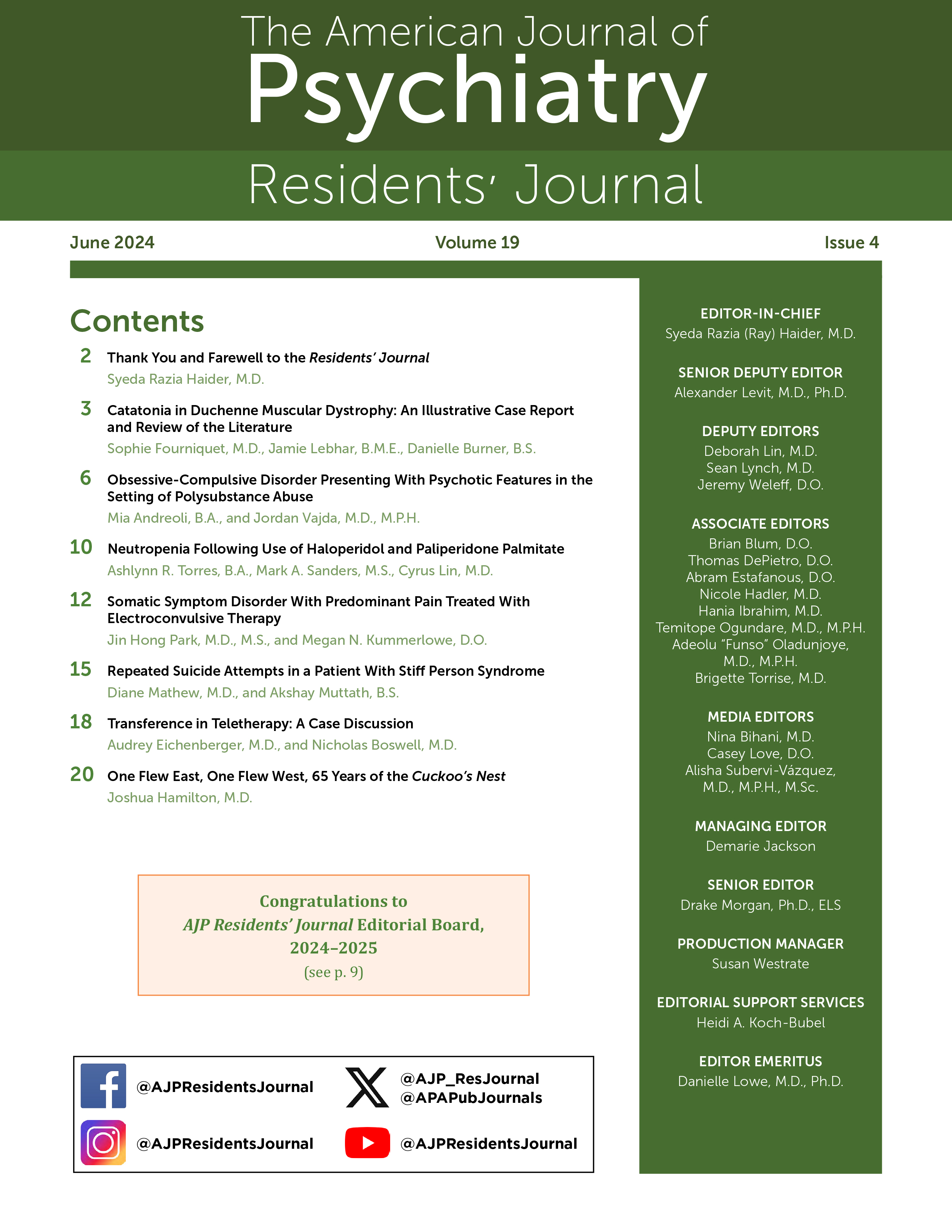Since its 1962 publication, few novels have matched Ken Kesey’s
One Flew Over the Cuckoo’s Nest with regard to influence in the fields of literature and psychiatry. Considered an American classic, the novel is praised for its promotion of individual autonomy and its sympathetic depiction of institutionalized patients (
1). Psychiatrists often criticize Kesey’s brutal depiction of electroconvulsive therapy (ECT), and the novel and film are common sources of stigma toward ECT (
2). However, the novel’s greatest flaws lie not with its depictions of psychiatric practices but with its widespread racist and sexist content (
3,
4). The novel’s problematic content poses a challenge as to whether it remains worth reading by modern psychiatrists.
Kesey’s experiences as a night-shift orderly on the psychiatric ward at Menlo Park Veterans Hospital anchor his satire to a dark reflection of reality (
5). The story is told by an unreliable narrator, Bromden, a Native American with paranoid delusions and feigned deafness (versus psychosomatic mutism). He recounts the arrival, power struggles, and eventual demise of the antisocial Randle McMurphy. McMurphy arrives at the ward via malingering and is portrayed as a savior figure by the end of the novel (
1). Through McMurphy’s struggles against an oppressive milieu, Kesey both challenged psychiatric practices and critiqued the greater conformist culture of his time.
Kesey is a staunch opponent of paternalism. Nurse Ratched represents violations of autonomy that Kesey undoubtedly witnessed at Menlo Park—harsh ward restrictions, infringements on patient privacy, and coercive treatments—all considered in patients’ “best interest.” Despite deinstitutionalization, psychiatry residents regularly face conflicts of beneficence versus autonomy. Psychiatrists are entrusted with the power to involuntarily hospitalize, administer emergent-agitation medications, and order restraints, as well as exert more subtle influence inherent to the role of both physician and psychotherapist. Although these are necessary skills for safe patient care, Kesey encourages reflection on the power differential between psychiatrists and patients and on ethical considerations of beneficence versus autonomy.
Kesey further succeeds in challenging many social stigmas of the 1960s through empathetic portrayals of historically marginalized people. Billy Bibbit is hospitalized for a stutter, Harding is a gay man when homosexuality was considered a mental disorder, and Bromden’s mutism stems from generational trauma and theft of Native American lands. It is irresponsible, however, to discuss One Flew Over the Cuckoo’s Nest without addressing its problematic depictions of bigotry. Kesey depicts the orderlies and nurses with a degree of racism and misogyny that is inexcusable. The orderlies, referred to only as “the black boys,” are racist caricatures who delight in taking rectal temperatures and are frequent targets of verbal and physical abuse by the patients. Mr. Turkle is an alcoholic stooge evocative of Uncle Tom. The women of the novel are treated no better. The night nurse is a passive target of sexual harassment. Candy is an oversexualized prostitute written primarily to be ogled by the male characters.
Nurse Ratched is the most tragic character of the novel when read from a feminist perspective (
4). Her defining character traits play into sexist stereotypes of women in power: she is sadistic, power hungry, and manipulative. Frequent physical descriptions focus only on her large breasts and how she “tries to hide them.” The climax of the novel centers on her being physically and sexually assaulted by McMurphy while the ward patients cheer him on. Rather than depicting racism and sexism as harsh realities of the time, Kesey instead perpetuates bigotry toward women and people of color.
Such bigotry prompts justifiable pause in recommending
One Flew Over the Cuckoo’s Nest as a source of reflection and learning for psychiatrists. To ignore its flaws in favor of focusing on the novel’s more progressive content is to turn a blind eye to injustices, both past and present. Kesey brought public scrutiny to our field during a time when lobotomies were standard of care, and he strove to humanize the experiences of people with mental illnesses. Kesey’s blind spots serve to remind readers of their own biases. Although tempting to brush off as unfortunate relics of the past, structural racial and gender biases continue to plague medicine and psychiatry. Read critically,
One Flew Over the Cuckoo’s Nest can prompt reflection on and discussion of darker aspects of the history of psychiatry (e.g., “hysteria” and mistreatment of women) and ongoing health disparities (such as Black patients facing more frequent use of restraints) (
6).
For better or worse, Nurse Ratched and the Cuckoo’s Nest have become part of the American lexicon, and close reading provides valuable insights not fully translated into film or other adaptations. Reflection on both the progressive and regressive aspects of the novel presents an opportunity to grapple with difficult realities facing psychiatric practice, both past and present. For both its strengths and failures, One Flew Over the Cuckoo’s Nest is a groundbreaking novel worthy of our continued study and critique.
Acknowledgments
The author thanks Jennifer Hyde, M.A., for her constructive criticism of the manuscript.
